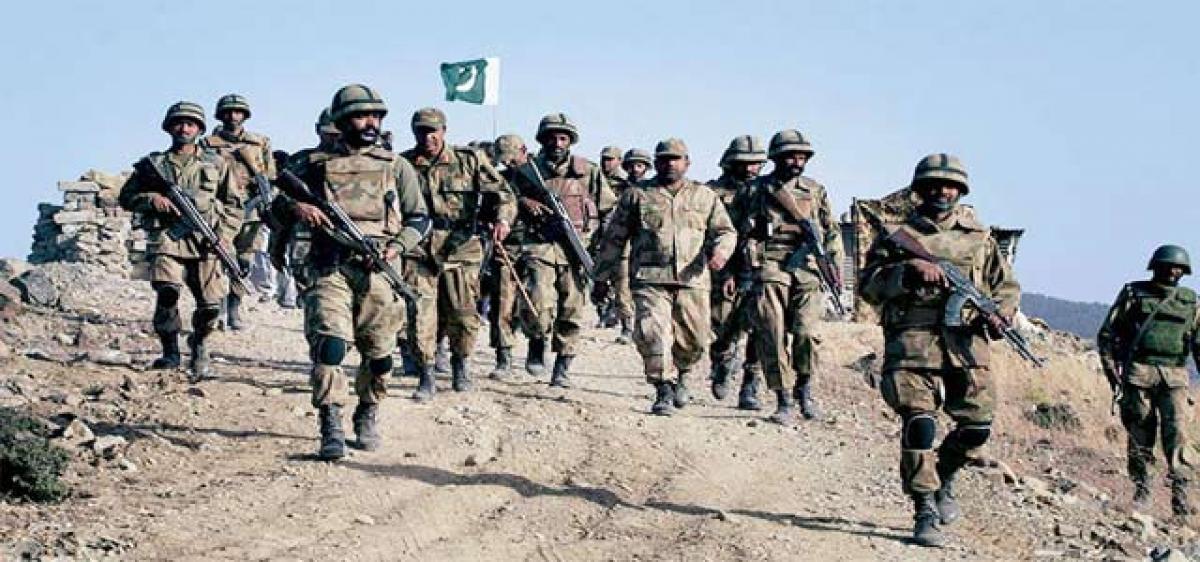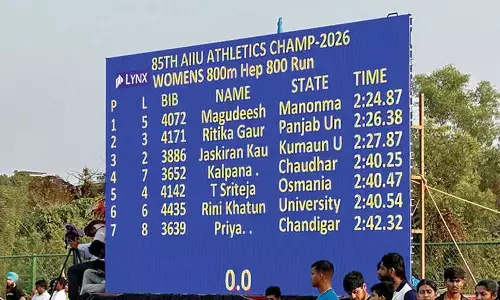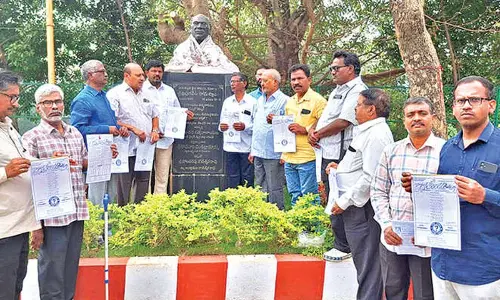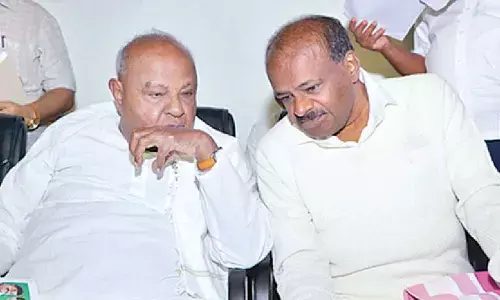Pakistan army calls the shots

Pakistan has held back from yet another precipice – for now—warding off a crisis that was threatening its polity. The alarming and often confusing situation can perhaps be understood if seen through the prism of its all-powerful arbitrator of the game – the Army.
Pakistan has held back from yet another precipice – for now—warding off a crisis that was threatening its polity. The alarming and often confusing situation can perhaps be understood if seen through the prism of its all-powerful arbitrator of the game – the Army.
On Tuesday, the Supreme Court stepped in to defuse the crisis by announcing a probe body against Prime Minister Nawaz Sharif whose family members are embroiled in the ‘Panamagate’, accused of having invested huge, mainly unaccounted, funds abroad. In doing this, it has weakened Nawaz and brought in the opposition, particularly Imran Khan, to work out and recommend the Terms of Reference for the probe.
All sides have welcomed it and can heave a sigh of relief. It is a reprieve for Pakistan. Its Interior Minister Chaudhary Nisar Ali Khan said that there are “no winners or losers, it is a victory for Pakistan”.
Now it is only for the outsiders to note that putting the opposition on par with a democratically elected government negates democracy. But that would be with a rider that Nawaz had invited it, He had almost succeeded in sweeping the scandal under the carpet for five months.
He had sympathy for part of that time when he was hospitalised in London. With him raring to go again, the army did not want him to get away.
A clash at the containers placed on roads to and in Islamabad to thwart Imran’s march, in a repeat of 2014, could have thrown the situation out of the control. It would have shamed Pakistan, noted for terror links and political and economic instability, in the eyes of the world. The army realised this and stepped in to keep the remote firmly in its hand.
One indication is the way an ‘outsider’ like Canadian-Pakistani cleric and tele-evangelist, Taherul Qadri who had initially agreed to join, was kept out of the planned November 2 siege of Islamabad by the opposition.
If it was parliament that upheld democracy and impliedly condemned Imran’s siege in 2014, this time the Supreme Court has stepped in.
Imran can celebrate – indeed, he began celebrating within minutes of the Supreme Court order – without his men causing the type of and the extent of damage they had then wrought. His threat of violence and the ‘third’ force – a thinly-veiled reference to a possible military takeover, worked.
With this remote fire-fighting, the army has yet again rocked the system to ensure its supremacy and pushed back the challenge it was facing from the civilian leadership at a time of its transition, that of Army Chief, Gen. Raheel Sharif, on the verge of retirement.
It shall remain a point of speculation whether he will actually hang his uniform or continue to be in office with his rank, tenure or task changed. He is immensely popular and a court has been petitioned that he be made to continue with the rank of Field Marshal. The clamour for his continuance may increase further. Whatever happens, he has ensured the overwhelming remote and/ or direct control of the armed forces on the nation’s destiny.
He has shown to the nation the civilian leadership for what it is – incompetent, corrupt, garrulous and ready to kill or be killed – all the time looking over the shoulder to see if the army will approve its acts of omission and commission.
To any discerning student of Pakistan affairs, it would be a given that if Nawaz Sharif began and furthered his political career as a protege of former military dictator Muhammad Zia-ul-Haq, used against the Bhutto clan, Imran Khan, too, is a creation of that very establishment – only its Chiefs change, not its philosophy of governing Pakistan -- willing to woo it and be used against Nawaz and whoever else it wants to discipline.
In the civil-military power struggle, it is evident that on the civilian side, the fight is between Nawaz and Imran. The Pakistan Peoples’ Party under Bilawal Bhutto Zardari is not in the game. Also, the court stepped in before the Islamists, eager to join the fight, could descend on the streets.
For all his faults and flaws, Nawaz has been doing fairly well, politically, despite a dismal economic situation and has emerged at the top of Pakistan’s political heap. He has been allowed to decimate the Muttahida Quami Movement (MQM), the country’s fourth largest party and one that represents the migrants from India. On this, both civil and military establishments seem to concur.
The army has acted before Nawaz could get too big for his boots like he had done by making peace overtures to India. Save his Kashmir talk at the United Nations General Assembly, he has also refused to join the current India-Pakistan cacophony.
His other ‘offence’ to the army has been trying to push the army on the defensive on the fight against militancy through a story leaked to ‘Dawn’ newspaper about a top-level meeting between the civil and military honchos.
With its Chief supposed to be retiring and a new Chief’s likely selection by Nawaz on the cards, the army saw this game through. It did not want to be at the receiving end of a civilian onslaught that would make the army look incompetent, ineffective or least of all, unwilling, to take on the militants – not after 500 Pakistani soldiers and 3,500 militants have died fighting them since Zarb-e-Azb was launched in June 2014.
The civilian leaders sanctimoniously sought to tell the army that it was playing favourites in the fight against militancy and was not going after its ‘assets’. This message was being sent abroad where everyone is more or less convinced that the army is actually doing so, but that it is because both civil and military establishments are agreed on. The ‘assets’, as is well known, are being used against India and Afghanistan.
For the army, being told by the civilian leaders to go after the militants is unacceptable considering that it was Raheel who had done what the politicians were dragging their feet on. The National Assembly had passed an all-party resolution recommending talks with the militants. Indeed, Raheel had done what even his predecessor, Gen. Ashfaq Kayani had not.
It did not require great intelligence among the military to conclude who could have leaked the story to ‘Dawn’; that it came from the ruling party, possibly from the cabinet itself. Hence, it unleashed its anger at the government for the leak.
The repeated pro forma denials of the story have not found takers at home or abroad. The crisis is a reminder of the ‘Memogate’ when then President Asif Zardari had sent a note to Washington fearing being removed after the elimination of Al Qaida leader Osama bin Laden.
Hussain Haqqani, Pakistan’s ambassador to the US and close to him was sacrificed. This time, attempts to sacrifice Cyril Almeida, who had written the ‘Dawn’ story was sought to be sacrificed, but his paper valiantly stood by him and the hue and cry at home and abroad prevented that.
The axe finally fell of Information Minister Pervaiz Rasheed. Significantly, he has not been accused of leaking the story. Chaudhry Nisar told the media that he had failed to prevent the story from being published. That Rasheed has hardly made any defence of what he did, or did not do, is significant.
For now, Nawaz has been put in his place and left to continue to fire-fight. Fending off this crisis would have made him super-strong and ready for even an early general election. His support in base in Punjab would have strengthened.
The army successfully has played a mercurial and inexperienced Imran against a more competent Nawaz. Whoever Nawaz chooses now as the next army chief – if and when he does, that is – the army will rule the roost in Pakistan.

















